We live in a violent society. I think that’s as close to a truism as anything can be. Mass shootings are a fact of life in America, and they happen with a sickening regularity. Gun violence takes a very heavy toll, and violent crime has spiked since the pandemic – specifically, homicides over the course of 2020. It was, of course, a year of exceptions, though many pundits and prognosticators have claimed that the increase is largely the result of police going into a kind of defensive crouch in the wake of the murder of George Floyd and the subsequent uprising.
I’ve no doubt that police departments have pulled back. Some made a point of doing so after previous high-profile deaths of people of color in police custody. On the podcast Why Is This Happening?, Patrick Sharkey talks about the various factors behind this rise in violent crime. Less aggressive policing is one, but he makes the point that a lot of community-based services that contribute significantly to reducing crime were shut down during the pandemic.
This, in some ways, reflects the divide between right and left perspectives on how best to address crime. Not surprisingly to anyone who follows this blog, I come down on the left side of this question, and I do so with what I consider to be really good reasons.
Fighting Crime With Crime
The idea that, as a society, we should reduce crime by over-policing disadvantaged communities is cynical beyond belief. Yes, you can marginally depress crime by mass arresting people, throwing them in jail for long terms, harassing people of color, etc., but in so doing you do irreparable violence to entire communities. That in itself is criminal far beyond the level of anything you might hope to prevent.
Other approaches work better, frankly – mutual aid, community-based counseling and mentorship services, nutrition programs, housing support, direct aid to families and individuals, etc. They also build communities, not destroy them.
Dirty Harry Syndrome
The advocates for hyper-aggressive policing work to create the impression that cases like the murder of George Floyd are necessary by-products of the service police provide. Sure, goes the argument, occasionally someone gets killed who probably shouldn’t have died, but that’s the price you pay for having safe streets. Can’t make an omelet without breaking a few skulls … I mean, eggs, right?
There’s a visceral appeal to this argument – a kind of cathartic, give-them-what-they-deserve attitude that makes a lot of white people feel right with the world. There’s a reason why movies like Dirty Harry were big hits – it’s a very attractive narrative for people who don’t do a lot of thinking.
The Political Economy of Policing
Of course, we know that political careers are made on hyper-aggressive anti-crime politics. That’s true of everyone from your local DA to the President of the United States. It’s a lot easier to get taxpayers to pay for MRAPs and sophisticated weapons for the cops than it is to get them to fund after-school programs and free breakfast for kids of color. And even though aggressive policing is a bad solution to the problem of crime, it’s an easier sell for politicians than the much more effective and less destructive approach that involves supportive community services.
Let’s face it, there’s a lot of money in expanding the police/prison state, just like there was a lot of money in slavery. That’s why defund causes so much consternation – it hits them where it hurts. Very insightful on the part of BLM to work that out. We need to carry that knowledge with us as we seek real solutions to this dysfunctional system.
luv u,
jp


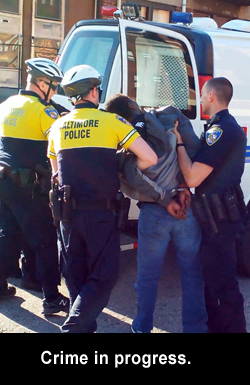 Monday night Baltimore was burning, in places. Tuesday morning, we heard all the usual stuff. Why are they burning their own neighborhoods down? What’s the matter with these people? Hey … they looted a liquor store? Same crap every time this happens. These, incidentally, are not the questions asked after every sports-related victory (or defeat) riot that happens in major American cities. Of course, those “thugs” tend to be mostly white people. They tend to belong to a more privileged class. Nothing to see here.
Monday night Baltimore was burning, in places. Tuesday morning, we heard all the usual stuff. Why are they burning their own neighborhoods down? What’s the matter with these people? Hey … they looted a liquor store? Same crap every time this happens. These, incidentally, are not the questions asked after every sports-related victory (or defeat) riot that happens in major American cities. Of course, those “thugs” tend to be mostly white people. They tend to belong to a more privileged class. Nothing to see here.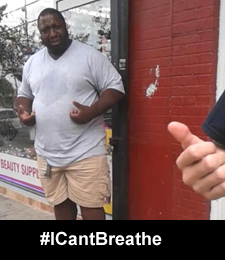
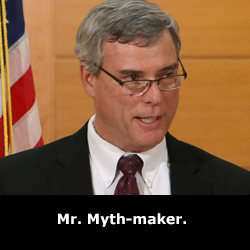 St. Louis County Prosecutor Robert McCulloch ultimately provided the grand jury with a distorted picture of Michael Brown that made him out to be a superhuman, hyper aggressive, predatory cop-hater. Darren Wilson’s description of Brown was surreal and, in my opinion, carefully concocted to create the impression that there was no other way to deal with this young man than with a hail of bullets. Brown’s face was like that of a “demon”; he had the strength of “Hulk Hogan”; while being shot, Brown was “bulking up” so he could somehow charge through the officer’s hysterical gunfire. This is myth making, pure and simple.
St. Louis County Prosecutor Robert McCulloch ultimately provided the grand jury with a distorted picture of Michael Brown that made him out to be a superhuman, hyper aggressive, predatory cop-hater. Darren Wilson’s description of Brown was surreal and, in my opinion, carefully concocted to create the impression that there was no other way to deal with this young man than with a hail of bullets. Brown’s face was like that of a “demon”; he had the strength of “Hulk Hogan”; while being shot, Brown was “bulking up” so he could somehow charge through the officer’s hysterical gunfire. This is myth making, pure and simple.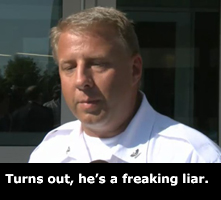 It comes as no surprise that Fox News and other gutter press outlets have latched onto this little tidbit about Wilson. That’s their form of “race card” journalism, playing to the more than sixty percent of white Americans who feel there is no racial component to this killing. But just as a thought experiment, let’s suppose for a moment that Wilson got slugged a few times by Brown – however unlikely that may be. A cop has the authority to use force in self defense. But six shots at a distance, at an unarmed man? And two to the head? How is that self-defense?
It comes as no surprise that Fox News and other gutter press outlets have latched onto this little tidbit about Wilson. That’s their form of “race card” journalism, playing to the more than sixty percent of white Americans who feel there is no racial component to this killing. But just as a thought experiment, let’s suppose for a moment that Wilson got slugged a few times by Brown – however unlikely that may be. A cop has the authority to use force in self defense. But six shots at a distance, at an unarmed man? And two to the head? How is that self-defense?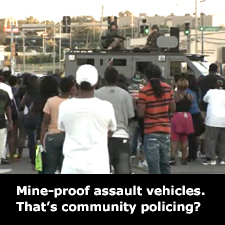 Still, the U.S. military action will continue in Iraq, sans dramatic justification. Neatly done. And we will continue to provide arms to the people fighting those other people we provided arms to. There’s a foreign policy for you. What’s even more worrying than that, though, is the degree to which our military have been providing arms, armored vehicles, and advanced tactical gear to police departments across the country, like the one in Ferguson, Missouri. In the wake of the seemingly arbitrary police killing of teenager Michael Brown, this mostly African-American community looks reminiscent of Soweto, South Africa, during the bad old days of Apartheid.
Still, the U.S. military action will continue in Iraq, sans dramatic justification. Neatly done. And we will continue to provide arms to the people fighting those other people we provided arms to. There’s a foreign policy for you. What’s even more worrying than that, though, is the degree to which our military have been providing arms, armored vehicles, and advanced tactical gear to police departments across the country, like the one in Ferguson, Missouri. In the wake of the seemingly arbitrary police killing of teenager Michael Brown, this mostly African-American community looks reminiscent of Soweto, South Africa, during the bad old days of Apartheid.